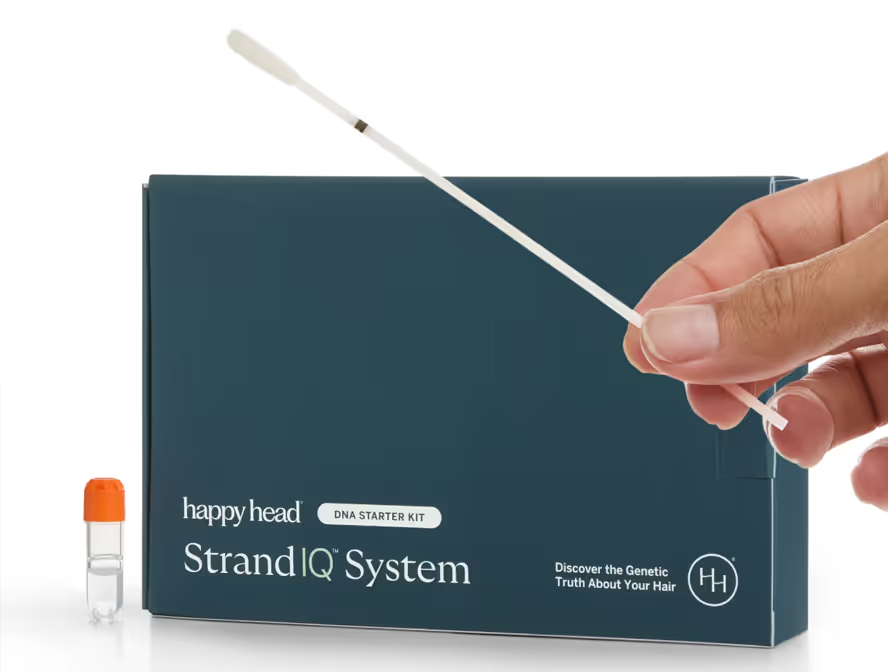Collagen isn't just foundational for skin—it's a key support structure in the scalp, helping maintain anchor points for hair follicles, promoting follicular regeneration, and protecting against environmental wear. The strength and resilience of your hair can be deeply influenced by how effectively your body produces and maintains collagen.
Why Collagen Synthesis Matters
Your body’s ability to synthesize collagen—particularly type I collagen—is influenced by genes that control the production, modification, and structural assembly of its amino acid building blocks. Key players include:
- COL1A1 (gene encoding type I collagen alpha‑1 chains, crucial for strength and structure)
- P4HA1/P4HA2 (prolyl 4‑hydroxylase enzymes essential for proper triple helix formation)
- LOX (enzymes that cross‑link collagen fibrils, enhancing stability and elasticity)
Variants in these genes can affect structural integrity—altering growth patterns, hair strength, and follicular resilience.
Likelihood Levels & What They Mean
- Low risk of collagen deficiency – Your collagen biology is robust, offering strong initial structural capacity; maintenance-focused strategies may serve best.
- Moderate risk of collagen deficiency – Collagen production is likely adequate, but may benefit from targeted support to optimize resilience.
- High risk of collagen deficiency – Your genetics suggest slower collagen production or weaker structural support within the scalp’s extracellular matrix (ECM).
Targeted Strategies by Risk of Deficiency
Your genetic profile can influence how efficiently your body produces and maintains collagen—a structural protein essential for hair strength, elasticity, and scalp integrity. Tailoring your approach based on your collagen synthesis levels ensures you’re supporting both follicle health and the surrounding tissue for optimal growth and resilience.
Low Risk: Build a Strong Foundation
If your Happy Head StrandIQ™ analysis shows you as being at a low risk for collagen deficiency, then simple lifestyle changes can help build a strong foundation for healthy hair.
- Stay consistent with nourishment
Keep vitamin C, zinc, and protein-rich habits that sustain collagen turnover. - Consider rejuvenation add-ons
Use occasional collagen peptide boosters or collagen-delivery skincare to reinforce aging scalp matrix. - Reduce oxidative stress
UV protection and antioxidant-rich diets help prevent collagen breakdown.
Moderate Risk: Optimize and Reinforce
With a moderate risk of collagen deficiency, your body may benefit from strategies that fine-tune production and protect existing collagen from unnecessary breakdown.
- Support synthesis through peptides
Regular use of collagen peptide supplements or skincare may help maintain scalp ECM. - Stimulate follicle drilling
Enhance matrix responsiveness with microneedling or low-level laser therapy. - Protect against degradation
Include MMP inhibitors like green tea polyphenols or topical antioxidants to preserve collagen.
High Risk: Maintain and Enhance
If your genetic profile suggests a high risk of collagen deficiency, it’s important to focus on rebuilding the scalp’s structural foundation through targeted nutrition and supplementation.
- Add collagen-support nutrients
Focus on vitamin C, proline-rich foods like bone broth, and antioxidants that aid collagen assembly. - Try oral collagen peptides
Can boost fibroblast activity and support matrix integrity. - Support collagen cross-linking
Ensure copper intake for LOX activity; support prolyl hydroxylase with co-factors like vitamin C and iron.
Path Forward
Collagen production is the backbone of scalp strength and healthy hair growth. If your genetics show a higher risk of collagen deficiency, you may benefit from strategies to rebuild and reinforce your collagen matrix. This can include eating proline-rich and vitamin C–rich foods, adding targeted supplements, and practicing scalp-stimulating habits. Even if your risk is low, maintaining collagen levels supports a strong foundation for strands to thrive—through everyday stress, aging, and environmental challenges.
Resources
StrandIQ SNP Marker Count: 1
StrandIQ Genes for Trait:
COL1A1
References:
Francès MP, et al. Utilising SNP association analysis as a prospective approach for personalising androgenetic alopecia treatment. Dermatol Ther (Heidelb). 2024 Apr;14(4):971–981. PMID: 38555553.
Geusens B, Haykal D. Genetic profiling and precision skin care: a review. Front Genet. 2025;16:1559510. PMID: 40529811.
Nistico SP, et al. Genetic customization of anti-aging treatments. J Clin Exp Dermatol Res. 2018;9:443. doi: 10.4172/2155-9554.1000443.
Sepetiene R, et al. Genetical signature—An example of a personalized skin aging investigation with possible implementation in clinical practice. J Pers Med. 2023;13(9):1305. PMID: 37763073.
This content, including StrandIQ™ DNA analysis reports and any Happy Head products and/or services referenced therein, is for informational and cosmetic purposes only. It is not intended to diagnose, treat, cure, or prevent any disease. This content does not constitute medical advice and should not be used to make healthcare decisions. References to prescription treatments are educational in nature. Always consult a licensed healthcare professional for any medical concerns or treatment decisions.










.avif)

